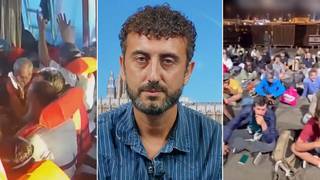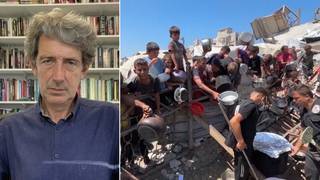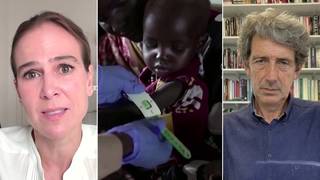
Humanitarian and economic conditions are rapidly deteriorating in Afghanistan, where the U.N. estimates that more than half of the population suffers from acute hunger. The country has fallen into an economic crisis after the U.S. and other Western countries cut off direct financial assistance to the government following the Taliban takeover in August. Taliban leaders are also unable to access billions of dollars in Afghan national reserves that are held in banks overseas. “Forty million civilians were left behind when the NATO countries went for the door in August,” says Jan Egeland, secretary general of the Norwegian Refugee Council, who recently visited Afghanistan and with refugees in Iran, where as many as 5,000 Afghans are fleeing every day. “They told me very clearly, 'We believe we will starve and freeze to death this harsh winter unless there is an enormous aid operation coming through.'”
Transcript
AMY GOODMAN: We begin today in Afghanistan, where humanitarian and economic conditions are rapidly deteriorating. On Monday, U.S. Secretary of State Antony Blinken held a video call with members of the AfghanEvac Coalition, who said they need more help evacuating tens of thousands of people who could be targeted under the Taliban government, and noted, quote, “Winter is coming. There is a famine already.” The United Nations estimates 60% — that’s more than half of Afghanistan’s population — now suffer from acute hunger and the country faces a financial crisis, after the U.S. and other Western countries cut off direct financial assistance to the government. Taliban leaders are also unable to access billions of dollars in Afghan national reserves held in banks overseas. The World Food Programme Executive Director David Beasley told the BBC Afghanistan is now the worst humanitarian crisis on Earth.
DAVID BEASLEY: It is as bad as you possibly can imagine. In fact, we’re now looking at the worst humanitarian crisis on Earth. Ninety-five percent of the people don’t have enough food, and now we’re looking at 23 million people marching toward starvation. Out of that, almost 9 million are knocking on famine’s door. The winter months are coming. We’re coming out of a drought. The next six months are going to be catastrophic. It is going to be hell on Earth.
AMY GOODMAN: The U.N. estimates half a million people could flee Afghanistan by the end of the year. Thousands of Afghan refugees are now crossing the border into neighboring Iran. According to the Norwegian Refugee Council, as many as 5,000 Afghans are fleeing into Iran every day. This could set up another crisis in Europe, where the European Union agreed Monday to new sanctions against Belarus for bringing some 4,000 migrants to the border with Poland and leaving them stranded in freezing forests.
For more, we’re joined by the NRC’s Secretary General Jan Egeland, who is in Oslo, Norway. He has just returned from a trip to Iran, where he met with Afghan refugees in a refugee camp. He recently tweeted, quote, “Iran alone hosts more displaced Afghans than 30 European countries combined. Despite this, nations in the 'European Championship In Erecting Barbed Wire against Refugees' give negligible funds for displaced Afghans elsewhere.” His recent New York Times op-ed is headlined “Afghanistan Is Facing a Total Economic Meltdown.”
Jan Egeland, welcome back to Democracy Now! Describe the scope of the catastrophe in Afghanistan right now and what you think needs to happen.
JAN EGELAND: Well, I was myself recently also in Afghanistan, and I sat down with the mothers in these displacement camps around Kabul. And I asked them, “What about the future? What do you think of the future?” And they told me very clearly, “We believe we will starve and freeze to death this harsh winter, unless there is an enormous aid operation coming through and unless there is a public sector again that is able to provide services.” It is as acute as that. Forty million civilians were left behind when the NATO countries went for the door in August.
JUAN GONZÁLEZ: Jan Egeland, the NATO countries not only went for the door, they took all of Afghanistan’s financial reserves with them as they left. They froze the assets of the Afghan government. Could you talk about the role of this issue of all of the money in Afghanistan essentially being held hostage by the Western nations that left?
JAN EGELAND: Well, yes. I mean, there is a lot of issues over these last 20 years, and one of them is that there was an enormous aid dependency. So, 70% of teachers, nurses, doctors, water engineers, garbage collectors, public workers were on the payroll of Western development donors. That was cut overnight. So, I met teachers who were eager to restart girls’ education and boys’ education. They hadn’t been paid since May. The banks are paralyzed because of the freezing of assets, so we, NRC, Norwegian Refugee Council, cannot transfer money to our colleagues in Kabul through the local bank system, nor even extract money there to pay salaries for our 2,000 aid workers that did not go for the door, who are there to stay and deliver, because of this freezing of the economy. Of course, the Taliban has an enormous responsibility for good governance in the place that they took over, but I sincerely believe that NATO countries mustn’t forget they left behind 40 million people.
JUAN GONZÁLEZ: And also, could you talk about the role of Iran and Pakistan, which have basically shouldered an enormous refugee population, estimates of 3 million Afghans in Iran alone, and the failure of, again, the West to assist these countries in their efforts to assist the refugees?
JAN EGELAND: Yes, indeed. I mean, 90% of Afghan refugees — and there are many millions of them — accumulated over 40 years of fighting since the Soviet invasion in Afghanistan 40 years ago. The 90% of these refugees are in two countries: Iran and in Pakistan. They are not in Europe. They are not in North America. They are not in the rich countries. They’re in these two neighboring countries. And in Iran, where I was, the refugees are given education and healthcare and so on, but the Iranian host communities are not getting much international assistance at all. So, now that 4,000 or 5,000 come over the border every single day, 320,000 since the Taliban took over, I mean, it means that the Afghan refugees in Iran are very afraid of the future, because they think that the little they have has to be divided in even smaller portions for all of those coming over the border. There has to be an investment in hope inside Afghanistan but also in the two neighboring countries.
AMY GOODMAN: I want to ask about the conditions in the health centers in Afghanistan. This is an excerpt from a France 24 program which features Hasseebullah Barakzai, an administrator at a hospital in Kabul, where patients have to buy their own medicine, gloves and syringes. The clip begins with Masood, a nurse in the hospital.
MASOOD: [translated] You see, we don’t have any medicine here. We used to have antibiotics, painkillers and vitamins here, but it’s empty now. In this cupboard, we had medicine for heart patients. Now we don’t even have a tablet left. This water cooler doesn’t work anymore. Look, we don’t even have water to wash our hands.
HASSEEBULLAH BARAKZAI: [translated] We don’t have enough food for the patients. Winter is here, and we don’t have enough fuel for the heating system.
AMY GOODMAN: Afghanistan was already suffering from decades of war, drought and economic collapse prior to the Taliban takeover, but now U.N. officials have been warning of a much worse humanitarian crisis in the country, with 23 million people facing hunger and 9 million on the brink of starvation. Children are bearing the brunt of the crisis. The U.N. warned that if urgent humanitarian assistance isn’t provided, more than a million children will die from malnutrition. The BBC spoke to a mother whose two severely malnourished children were hospitalized.
MOTHER: [translated] The pain that he’s suffering, I also feel it. Only God knows what I go through when I look at him. Two of my children are facing death because we don’t have any money. I want the world to help Afghan people. I don’t want any other mother to see their children suffering like this.
AMY GOODMAN: Just some of the voices of Afghanistan. Jan Egeland, as Juan just pointed out, when the Taliban toppled Afghanistan’s government, the country suddenly lost access to $9 billion in Central Bank reserves, frozen by the Biden administration. For those countries that are saying, “We will not support the Taliban, so we will not give money,” what do you say to them?
JAN EGELAND: Well, I say, “Correct.” Money should not go to the military political group called the Taliban that took power by force. The money should go to the people, and it is possible.
So, number one, there has to be trust funds, as we call it, that is held by U.N. agencies, that funnel money directly to the hospitals, that you just showed, where people are dying at the moment. It can go straight to the teachers that were on the payroll of the World Bank previously, can go straight to them. So, the money can go through us, international organizations, straight to the people.
Secondly, unfreeze those funds that will enable banks to function again. At the moment, we cannot even buy relief items in Afghanistan. We have to ship them over, take them over from Pakistan and Iran, which means that employment is dying in Afghanistan.
And thirdly, donors, come down from the fence. See that we are there. We are reliable channels for funding. The money will go to the people. Transmit funding, not just come with pledges. This will not become Switzerland in a long time. You have to share the risk with us to save lives this winter.
JUAN GONZÁLEZ: And, Jan Egeland, I wanted to ask you: Isn’t it in the interest of NATO and the Western nations that were in Afghanistan to assure some kind of an orderly government in Afghanistan? Because if the Taliban are not able to deliver basic services to their people, doesn’t that give possibility for a rise of even more extremist groups within the country, like ISIS?
JAN EGELAND: That could well be. But anyhow, I would argue that nobody wants an implosion in Afghanistan, where 40 million people see: “I have no hope here. I need to leave.” I mean, it would go — people would then use the neighboring countries as a segue, a channel to go elsewhere, including to Europe, where we have worked ourselves up in a hysteria for a very few thousand migrants on the Polish-EU border. Hundreds of thousands have now assembled at the Iranian-Afghan border on the Afghan side with the intent to get over. Iranian refugees I spoke to said, “All our relatives have started to wander.” They want to come to Iran, and they want to wander towards Europe. So it is in everybody’s interest to stabilize things in Afghanistan, and I just listed the three things that can be done. It’s not rocket science. It has to happen tomorrow. We have no time really before the massive death starts.
AMY GOODMAN: I’d like to turn to Hassan Esfandiar of the Iranian Red Crescent, who spoke to Al Jazeera about the difficulties of providing assistance to the thousands of Afghans you just described arriving at the border every day.
HASSAN ESFANDIAR: Due to the current situation of sanctions to the country, unfortunately, we are not able or we were not able to receive the international donations assistance because the banking channels are blocked, and then we are not able to receive the humanitarian donations. So, so far, the Iran Red Crescent has tried to provide its own resources for the Afghan displaced populations who are approaching the border. As it is mentioned by your colleagues in the report, the average number of the populations who are approaching the Iranian borders are between 2,000 to 7,000 per day, so it’s a huge number.
AMY GOODMAN: So, Jan Egeland, of course, the U.S. has sanctions against Iran, so how can Iran be helped in dealing with this number of refugees that are crossing the border, 4,000 or 5,000 every day? What’s getting the West’s attention is what’s happening in Eastern Europe. Earlier today, Polish border guards firing tear gas, water cannons at hundreds of asylum seekers trying to push their way through a razor wire barrier erected along the Poland-Belarus border. That’s 4,000 to 5,000 refugees there altogether. What’s happening in Iran is every day. So, if you could address both, from Iran to Poland-Belarus border?
JAN EGELAND: Well, as a European, I’m ashamed at what’s happening in our part of the world, what Belarus is doing by using vulnerable migrants like chess pawns in some kind of a power play, and then Europe basically saying, “We’re not going to hear any asylum applications at all” — in violation of international law — “We’re going to throw everybody out,” and then migrants in some kind of a stalemate with the army on either side wanting them to go in opposing directions. That’s Europe with a few thousand. In Iran, we are having between three-and-a-half and four million Afghans at the moment. Three-and-a-half to four million. I think that has to be sunk in — 4,000 or 5,000 more per day, and a very small international aid program.
Again, the United Nations is there with UNHCR, the refugee agency. NRC is there. We can do more. We need more funding. We also ask for more freedom of operation from the Iranian authorities so we can win this race against the winter on both sides of the border, inside Afghanistan but also in Iran and in Pakistan. It has to be understood that a lot is at stake. It’s not a small catastrophe. It’s 23 million people who have no more food. They will wander. I would go if I was in that situation. I would also wander to where I could get food for my children.
JUAN GONZÁLEZ: And, Jan Egeland, in the particular role of the United States in all this as being the primary power that led the War in Afghanistan for so many years, and then the Biden administration suddenly pulling out, what would you urge the Biden administration to do now?
JAN EGELAND: The U.S. should lead, really, as it has in the military political project over the last 20 years, should lead in the humanitarian relief operation. Unfreeze the assets that is necessary to get the public sector going. The World Bank sits on funds. So, when I wrote to the World Bank president, the answer back was, “Well, we’re willing to do things if the member states on our board, the U.S. and others, tell us to release money. We can’t release money.” It’s sitting there for teachers and nurses and hospitals and whatnot in Afghanistan.
And also, enable us as organizations to really work effectively and efficiently on both sides of the border. Iran sanction is making it difficult for us to work to some extent. And the Norwegian Refugee Council couldn’t even transfer money for a full year after the Trump administration started these sanctions, because there was no bank with a backbone strong enough to transfer aid money to our people because they were so afraid of one day coming in court in New York because of a potential break of these sanctions. It is paralyzing for us who are on the frontlines of humanity.
AMY GOODMAN: Jan Egeland, the U.N. climate summit just wrapped up in Glasgow with a significantly weakened pact that activists, scientists, many governments say falls far short of what’s needed to avert a climate catastrophe. You tweeted, “This deal is better than no deal, but far from achieving climate justice and avert disaster displacements. There are too many carbon spewing spoilers among the negotiators. The fight must now be taken to each and every big polluter.” Name names. Talk specifically about what has to be done and how the climate catastrophe generates climate refugees.
JAN EGELAND: Well, I would start, actually, by going to those who intend to burn a lot of coal now, that will lead to — and Afghanistan and Iran, that we’re talking about, have both massive droughts at the moment. It is climate change-fueled. So, really, it’s the major industrialized nations that has to do most, including China and now India, that are carbon-spewing and plan to spew out much more carbon in the coming years. We have to call a spade a spade. Look at where the emissions comes from, and all has to come dramatically down. Afghans, they emit nothing really, and they are the first to starve because of this. The economic chaos and the droughts have created chaos in Afghanistan. Same in the Sahel belt. I was in places like Burkina Faso and Niger and so on, and you see how vulnerable they are. They haven’t emitted anything, really, in recent decades, and they are first and hardest hit.
AMY GOODMAN: Jan Egeland, we want to thank you for being with us, secretary general of the Norwegian Refugee Council. We’ll link to your “piece”: https://www.nytimes.com/2021/10/12/opinion/afghanistan-taliban-g20-aid.html in The New York Times, “Afghanistan Is Facing a Total Economic Meltdown.” He’s speaking to us from Oslo, Norway.
Coming up, we look at the U.S.-China summit that took place last night and look more broadly at U.S.-China relations. We’ll speak to Alfred McCoy. His new book, out today, To Govern the Globe: World Orders and Catastrophic Change. Stay with us.












Media Options